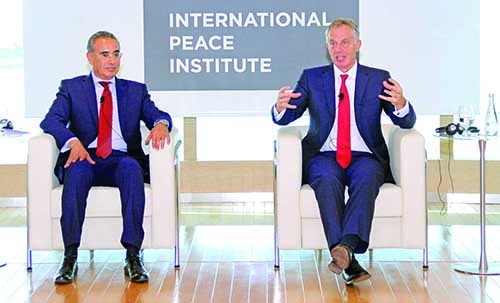Debate on Middle East
The International Peace Institute (IPI), Middle East and North Africa yesterday hosted a Global Leaders Series Presentation on “Opportunities and Challenges Facing the Middle East" at IPI Mena office in financial harbour.
Evolution was better than revolution, and evolution is the way forward, according to participants who are of the opinion that it was better for the Middle East if it would strive to evolve. The main reasons behind the Arab Spring, range from frustrated youth, rise of social media, mixture of bad politics, weak institutions, and the uncertainty where religion belongs in the government, it was argued.
During the session moderated by IPI, MENA Director, Nejib Friji, government officials, ambassadors, various religious figures, businesswomen and men, media leaders and civil society representatives discussed with Tony Blair, former Prime Minister of the United Kingdom, the requirements of successful countries.
The latter has two common attributes, namely - an open-minded society that promotes religious tolerance and an economy that is rule-based.
The discussion delved upon attempts to de-stabilize successful countries arguing they will have unpleasant consequences. Iran was cited as an example for exporting an ideology that leads to instability. Tehran was criticized for backing Hezbollah.
Fear was expressed that the Iranian threat facing the Middle East stems from an ambition to revive the Persian Empire.
The meeting focused on the recent developments in Syria, Iraq, Palestine, Egypt, Libya, Yemen and other Middle Eastern and North African countries. In this regard, the participants agreed on the need to unite all efforts to tackle violent extremism.
IPI initiative on Regional Cooperation and Integration project was raised and praised as an important approach to seek an end to divisions, conflicts and lay the ground for sustainable cooperation for development between the large number of nations in the region and the neighbourhood.
The discussants commented that Iran was exporting an ideology that leads to instability and criticised its backing of Hezbollah. They also said that the problem is the nature of the ideology and that the people of Iran could be saved if they were liberated from the ideology.
The importance for President Sisi of Egypt to succeed was stressed alongside that of the Muslim Brotherhood losing power.
On Iraq’s possible situation during the Arab Spring if Saddam Hussein was still in power, it was argued that Saddam was never going to last. Comments went that societies work best when they are pluralistic and there was a need to create a society in which people can tolerate disagreement.
Israel’s refusal to accept the Arab Peace Initiative of 2002 was also criticised.
Attention was drawn to the plight of the refugees in Jordan, stressing that one out of five people in Jordan is a Syrian refugee.
The session concluded with a plea that successful societies should be sought through open-mindedness and a rule-based economy. Religious leaders have a powerful role in promoting peace and tolerance, educating people of their faith not to be disrespectful to other religions.
Related Posts

